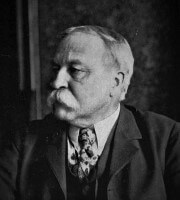About William Dean Howells
William Dean Howells (March 1, 1837 in Martins Ferry, Ohio – May 11, 1920 in New England) was an American poet, writer, literary critic and magazine editor. He is best known for his works A Modern Instance (1881) and The Rise of Silas Lapham (1885). In 1852, his father, who was an editor and printer, published a poem of his son in the Ohio State Journal without William's knowledge. At the same time, he learned various languages, including German, through self-study, and began writing short poems and essays, which he published in the Ohio State Journal and the Atlantic Monthly. Howells achieved his first national success with a biography of presidential candidate Abraham Lincoln, which he used in his election campaign. With the income from this work, Howells financed his move to New England, where he met numerous literary great writers, including Nathaniel Hawthorne, Henry David Thoreau, Walt Whitman, Ralph Waldo Emerson and Sarah Orne Jewett. He wrote for various magazines, and published the first of his books of travel, Venetian Life, in 1866, the same year he became assistant editor of the Atlantic Monthly in Boston, then its editor for ten years, from 1871 to 1881.In 1869, he met for the first time the writer Mark Twain, with whom he maintained a fruitful friendship throughout his life. His first novel, Their Wedding Journey, appeared in 1872, but his reputation as a novelist only took off in 1882 with the publication of A Modern Instance which described the slow dissolution of a marriage. After this date, the realistic vein of his novelistic production, associated with the current of thought of social Catholicism, becomes clearer and illustrates the flaws, evils and ideological contradictions of American society of his time, notably in The Rise of Silas Lapham, (1885), a ruthless critique of capitalism through the dazzling social rise of a young upstart, and in Indian Summer (1886) , illustration of the indolence and headlong rush of a journalist in his forties from Indiana, named Theodore Colville, symbol of the fear of commitment and of the sense of responsibility of some American intellectuals. Howells' novels describe the daily life of the middle classes, the pretensions of the upper middle classes and the social changes of America at the end of the 19th century. His writing, always sober, seeks to give an image of social reality by describing it as faithfully as possible, without resorting to metaphors and without falling into sentimentality.
An influential literary critic, his articles and essays played a major role in the dissemination of European realism in the United States. He also favored the translation of the works of Heinrich Heine, Tolstoy and Henrik Ibsen in particular. He also encouraged many young American novelists, including Stephen Crane, Frank Norris and the African-American Paul Laurence Dunbar, but also wrote rave reviews about the poet Emily Dickinson. As a poet, he published a large collection of poetry under the title Stops of Various Quills in 1895. In a completely different register, he signed The Flight of Pony Baker, a work of children's and youth literature in 1902. He was one of seven founding members of the American Academy of Arts and Letters when it was founded in 1904.
He died in his sleep shortly after midnight on May 11, 1920.
Browse all poems and texts published on William Dean Howells









